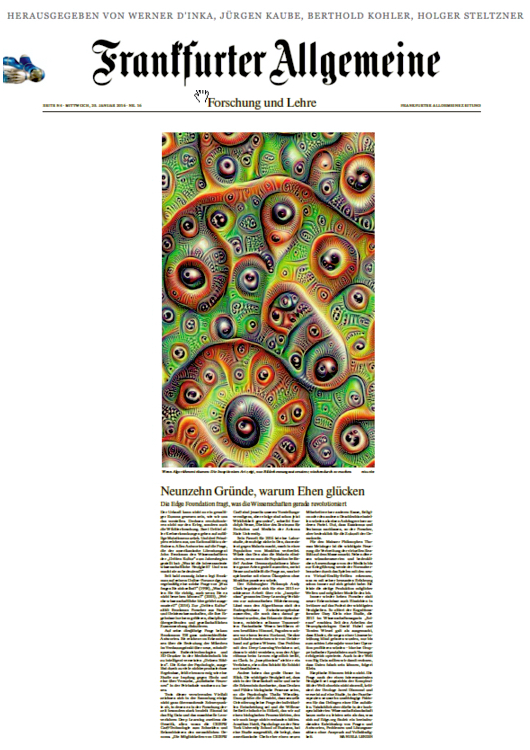Manipulation of the species
Despite this bewildering variety stand out in the collection some not entirely surprising focus from where it currently seething particularly strong in the research: Once the Big Data and machine learning techniques Deep Learning secondly genetics, especially the CRISPR / Cas9 technology for cutting and recombining the human genome. "The possibilities of CRISPR / Cas9 are beyond our imagination, but some have already become reality," writes Randolph Nesse, director of the Center for Evolutionary Medicine and Arizona State University.
His favorite is a 2016 laboratory study, according to which a gene that makes them resistant to malaria, rapidly spreads in a population of mosquitoes. If the gene thus eliminate malaria, if you could free the population? Other genetic manipulation could exterminate entire species targeted, says Nesse and connects to the question of what would happen, for example, with an ecosystem without mosquitoes.
The Edinburgh philosopher Andy Clark is passionate about a 2015 published work on a "Inceptionism" called deep-learning method for automatic image recognition. Lets you eject the algorithm instead of the final interim results that were even trimmed to it, the Recognized overemphasize arise strange dream worlds: fantastic creatures inhabit a cloudy sky, pagodas grow appear as if by magic on the green meadows in front of an empty horizon, executors and sheep.The problem with the Deep-learning process is that we do not understand what the algorithm in learning actually drives, so Clark. In "Inceptionism" he provides a method to visualize precisely this layer by layer.
Insight into new realities
Others have the big picture. The most important news is that in society more and more set the realization that biological processes are thinking and feeling, so the psychologist Thalia Wheatley. Given the recognition that sexual orientation is not a matter of individual choice and free will belong just a label that we stuck to a biological process that we would not have understood a long time. Jonathan Haidt, a psychologist at New York University School of Business, a study selected, which indicates that American chefs would rather adjust a new employee to a different race, religion, or of the opposite sex as a trailer of another party. Well, that racism and sexism subside, the researchers but worrying for the future of democracy.
For the Mainzer philosopher Thomas Metzinger the main novelty is the proliferation of virtual reality in the mass market. In addition to various desirable and questionable applications from medicine to warfare the average consumer would recognize by playing with the new virtual reality goggles, what it had always been with his conscious experience at: you strip the steady production of possible worlds and possible Models of the ego.
Again and again raise researchers take new knowledge and insights into errors on the podium of the most important news. Thus, the cognitive scientist Gary Klein cites a study that appeared in the 2015 journal "Science". Since the work of neurophysiologist David Hubel and Torsten Wiesel was taken for granted that children who were born blind because of a lens clouding, would benefit only until the eighth year of an operation - to a group of Indian specialists and teens successfully operated. Even in the world of Big Data, we should expect that data may be wrong, concludes Klein.
Skeptical voices are not lacking. The question of a most interesting piece of news is, given the complexity of the world in any case does not make sense, criticized the geologist Jared Diamond, citing a recent study, enumerate nineteen independent factors for the success of a marriage in the marriage counselor. In fact, probably afford to than what is found on Edge.org in the highly specialized academic landscape hardly more: an impressive kaleidoscope of questions and answers, problems and solutions is not exhaustive. [Continue reading on FAZ]
Read highlighted contributions from: Randolph Nesse, Andy Clark, Thalia Wheatley, Thomas Metzinger, Gary Klein, Jared Diamond.

